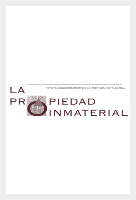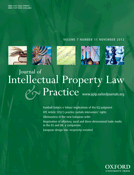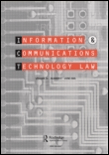
Revista La Propiedad Inmaterial
Scope & Guideline
Fostering Collaboration in the Realm of Intellectual Property
Introduction
Aims and Scopes
- Intellectual Property Rights Enforcement:
The journal publishes research related to the enforcement of intellectual property rights, including legal frameworks and practical challenges faced by countries in implementing these rights. - Cultural and Creative Industries:
It explores the intersection of intellectual property with cultural and creative industries, examining how IP laws impact these sectors and contribute to economic development. - Comparative Legal Analysis:
The journal presents comparative studies of intellectual property laws across different jurisdictions, highlighting similarities, differences, and potential reforms. - Impact of Technology on IP:
Research on how technological advancements, such as artificial intelligence and blockchain, influence intellectual property laws and practices is a consistent focus. - Consumer Protection and IP:
The implications of intellectual property on consumer rights, including misleading branding and unfair competition practices, are examined to understand the balance between IP protection and consumer interests. - Intersection of IP with Human Rights:
The journal addresses the relationship between intellectual property rights and human rights, discussing issues such as access to medicines and cultural heritage.
Trending and Emerging
- Artificial Intelligence and IP:
There is a rising interest in the implications of artificial intelligence on intellectual property rights, particularly concerning authorship, ownership, and patentability. - Cultural Heritage and IP:
The protection of cultural heritage through intellectual property rights is gaining attention, highlighting the need for frameworks that respect and preserve traditional knowledge. - Digital Economy and IP:
Research focusing on intellectual property in the context of the digital economy, including issues related to e-commerce, social media, and digital content creation, is increasingly prominent. - Health and Access to Medicines:
Emerging discussions around the role of intellectual property in public health, particularly concerning access to medicines and the balance between innovation and affordability, are trending. - Sustainability and IP:
The intersection of intellectual property with sustainability practices, particularly in industries like agriculture and pharmaceuticals, is becoming a significant area of inquiry. - Blockchain and IP:
The exploration of blockchain technology’s potential to transform intellectual property rights management and enforcement is an emerging theme of interest.
Declining or Waning
- Traditional Copyright Issues:
While copyright remains an essential area of focus, traditional discussions around copyright limitations and exceptions have decreased as new topics, such as digital rights and the impact of technology, gain prominence. - Patent Law in Established Industries:
The focus on patent law related to established industries (e.g., pharmaceuticals) has waned as the journal shifts towards more contemporary issues like the implications of new technologies on patentability. - Unfair Competition in Traditional Markets:
Research on unfair competition primarily in traditional markets has declined, possibly due to the rise of digital marketplaces and the need for new frameworks to address modern challenges. - Regional IP Policy Analysis:
Analysis focused on regional IP policies that were once prevalent seems to be diminishing, as the journal increasingly emphasizes global comparative studies.
Similar Journals

International Journal of Law and Information Technology
Exploring Legal Frontiers in the Digital Age.The International Journal of Law and Information Technology, published by Oxford University Press, stands as a leading forum for the exploration of the evolving intersection between law and information technology. With its ISSN 0967-0769 and E-ISSN 1464-3693, this esteemed journal has been at the forefront of academic discourse since its inception in 1993 and is poised to continue influencing the landscape of legal scholarship and information sciences until at least 2024. With a prestigious categorization in the Q2 quartile for both Law and Library and Information Sciences, the journal is prominently ranked in the 76th and 64th percentiles respectively within Scopus rankings. Offering insights on vital themes such as privacy, intellectual property, and technological regulation, the International Journal of Law and Information Technology provides a valuable resource for researchers, practitioners, and students alike, facilitating a deeper understanding of the legal challenges and opportunities presented by technological advancements. While not an open-access publication, the rigorous peer-reviewed articles serve to enrich the global academic community’s knowledge in this critical and dynamic field.

Revista e-Mercatoria
Driving Research Excellence in Economic StudiesRevista e-Mercatoria is a distinguished academic journal published by UNIV EXTERNADO COLOMBIA, dedicated to the comprehensive field of commerce and economic studies. With its ISSN 1692-3960, this journal serves as a vital platform for researchers, professionals, and students seeking to explore the dynamic intricacies of market behavior, economic strategies, and commerce innovations. Though currently not indexed as open access, it upholds a commitment to disseminating high-quality research that contributes to theoretical and practical advancements in commerce. By fostering scholarly discussions and publishing original research, Revista e-Mercatoria plays an essential role in enhancing knowledge and understanding in the realm of economics and trading practices, supporting the academic and professional development of its diverse readership.

UNIVERSITY OF CHICAGO LAW REVIEW
Fostering Innovative Legal Perspectives for TomorrowUniversity of Chicago Law Review is a prestigious academic journal dedicated to advancing legal scholarship, published by the University of Chicago Law School. Renowned for its rigorous peer-review process and high editorial standards, this journal is recognized as a leader in the field of law, achieving a Q1 ranking in the 2023 category of Law and occupying a notable position within the Scopus rankings, specifically at #199 out of 1025 in the Social Sciences - Law category, placing it in the 80th percentile. The journal provides an essential platform for legal scholars, practitioners, and students to engage with cutting-edge research and theory across various legal disciplines, including constitutional law, criminal law, and comparative law. With a commitment to fostering critical discourse, the University of Chicago Law Review has been instrumental in shaping legal thought, making it a vital resource for anyone seeking to contribute to or understand the evolving landscape of legal studies. Although it does not currently offer open access, subscription options provide robust access to its extensive archive of scholarly articles since its inception.

BOSTON UNIVERSITY LAW REVIEW
Exploring the forefront of legal innovation.BOSTON UNIVERSITY LAW REVIEW, a premier legal journal based in the United States, is widely recognized for its contributions to the field of law. Since its inception in 1973, this esteemed publication, with ISSN 0006-8047, has provided a platform for rigorous scholarship and innovative discourse in legal theory and practice. Published by BOSTON UNIV LAW REVIEW, the journal is categorized in the top-tier Q1 of law journals as of 2023, reflecting its high impact and relevance in legal scholarship, backed by a solid Scopus ranking of #219 out of 1025 in Social Sciences _ Law, placing it in the 78th percentile. While not an open-access journal, it remains a vital resource for legal researchers, practitioners, and students, offering comprehensive analyses and insights that inform contemporary legal practices. With a commitment to advancing legal understanding, the BOSTON UNIVERSITY LAW REVIEW seeks to engage and inspire critical thought among its readership.

China-EU Law Journal
Navigating the Complexities of International LawChina-EU Law Journal, published by SPRINGER HEIDELBERG, serves as a pivotal platform for discourse in the field of international law, particularly focusing on the legal dynamics between China and the European Union. With its ISSN 1868-5153 and E-ISSN 1868-5161, the journal caters to a growing audience interested in understanding the complexities of legal relations, policy frameworks, and regulatory challenges that arise within this crucial geopolitical arena. Although currently not labeled as open access, the journal strives to provide rigorous peer-reviewed articles that contribute significant insights into the evolving legal landscape, making it an essential resource for researchers, practitioners, and students alike. By fostering scholarly dialogue, the China-EU Law Journal aims to enhance the academic community's understanding of cross-cultural legal perspectives, further cementing its role in shaping modern legal thought.

Journal of Property Planning and Environmental Law
Transforming urban landscapes with cutting-edge legal insights.Journal of Property Planning and Environmental Law is a premier academic publication dedicated to advancing the interdisciplinary dialogue surrounding property rights, environmental sustainability, and urban development. Published by Emerald Group Publishing Ltd in the United Kingdom, this journal provides a platform for rigorous peer-reviewed research that shapes policy and practice in the fields of law, urban studies, and environmental science. With an impressive Q1 ranking in Law and significant standing in related disciplines—holding a 95th percentile rank in Social Sciences Law and 82nd percentile in Urban Studies—this journal exemplifies excellence and innovation. Researchers, professionals, and students can access thought-provoking articles, case studies, and reviews that not only address current challenges but also propose actionable solutions. The Journal of Property Planning and Environmental Law is committed to fostering a rich academic community, propelling the study of environmental and legal frameworks critical to effective urban planning.

Vestnik of Saint Petersburg University-Law-Vestnik Sankt-Peterburgskogo Universiteta-Pravo
Enriching Understanding of Russian Legal PrinciplesVestnik of Saint Petersburg University-Law, published by St Petersburg University Press, is a vital academic resource in the field of law, particularly significant within the Russian legal landscape. With an ISSN of 2074-1243 and an E-ISSN of 2587-5833, this journal serves as a platform for rigorous research, critical analysis, and scholarly discourse, contributing to the advancement of legal knowledge and practice. Although currently classified in the Q4 quartile for the year 2023 by Scopus rankings, it holds a unique position within the academic community, catering to a diverse audience of researchers, legal professionals, and students, especially those interested in the evolving nuances of law in Russia. You can explore comprehensive studies and articles that reflect the contemporary challenges and developments in law, while benefiting from the journal's focus on fostering a deep understanding of legal principles. The journal runs from 2019 to 2024, encapsulating emerging trends and insights in law that are critical for continuous learning and growth in this discipline.

Journal of Intellectual Property Law & Practice
Illuminating the path of legal innovation in IP.The Journal of Intellectual Property Law & Practice, published by Oxford University Press, is a premier academic journal dedicated to the exploration and discussion of issues surrounding intellectual property law. With an ISSN of 1747-1532 and an E-ISSN of 1747-1540, this journal has established itself as an essential resource in the field, featuring high-quality articles that contribute to the advancement of legal scholarship and practice. Recognized in the 2023 Category Quartiles as Q2 in Law, the journal ranks within the top half of its field and provides a global platform for researchers, practitioners, and policymakers. Covering a comprehensive range of topics from copyright to patent law, the journal encourages interdisciplinary dialogue and aims to bridge academic and professional practice. Although it operates under subscription models, it ensures wide accessibility of its rigorous content and analysis, maintaining its significance in shaping the discourse on intellectual property law from its inception in 2005 to the anticipated 2024. This journal not only supports scholarly communication but also fosters a community committed to the dynamic challenges of intellectual property in today’s innovative landscape.

Information & Communications Technology Law
Illuminating the Intersection of Law and CommunicationInformation & Communications Technology Law, an esteemed journal published by Routledge Journals, Taylor & Francis Ltd, serves as a vital platform for the dissemination of critical research and analysis in the intersecting fields of law, communication, and computer science. Established in 1992, this journal has continuously evolved to address the dynamic landscape of information technology and its legal implications, maintaining a significant H-Index that reflects its scholarly impact. With a notable impact factor that places it in the second quartile for communication and law disciplines, and in the third quartile for computer science applications as of 2023, it ranks impressively within the Scopus Metrics—highlighting its relevance and reach among global academia. Covering vital topics from data privacy to intellectual property rights in the digital age, the journal appeals to researchers, practitioners, and students alike by offering insightful articles that explore contemporary issues and emerging trends within ICT law. Although it does not currently offer open access options, its comprehensive articles and reviews are indispensable for anyone seeking to understand the complexities of technology regulation and legal frameworks.

NTUT Journal of Intellectual Property Law and Management
Shaping Tomorrow's Intellectual Property LandscapeNTUT Journal of Intellectual Property Law and Management is a prominent academic platform published by NATIONAL TAIPEI UNIVERSITY OF TECHNOLOGY, focusing on the critical intersection of intellectual property law, business strategy, and management practices. Established in 2012, this journal disseminates research aimed at enhancing the understanding and management of intellectual property rights, particularly within the dynamic landscape of Taiwan and beyond. Although it is classified within the Q4 quartile across diverse categories such as Business and International Management and Law, this journal remains an essential resource for those seeking insights into contemporary issues and developments within the field. Researchers and practitioners alike will find value in its contributions, which are crucial for navigating the complexities of intellectual property in today’s global economy. While currently not offered as open access, the journal aims to foster scholarly discussion that can drive innovation and protect intellectual creativity. With its continuing commitment to academic rigor and relevance, the NTUT Journal stands as a vital resource for anyone engaged in intellectual property law or management.